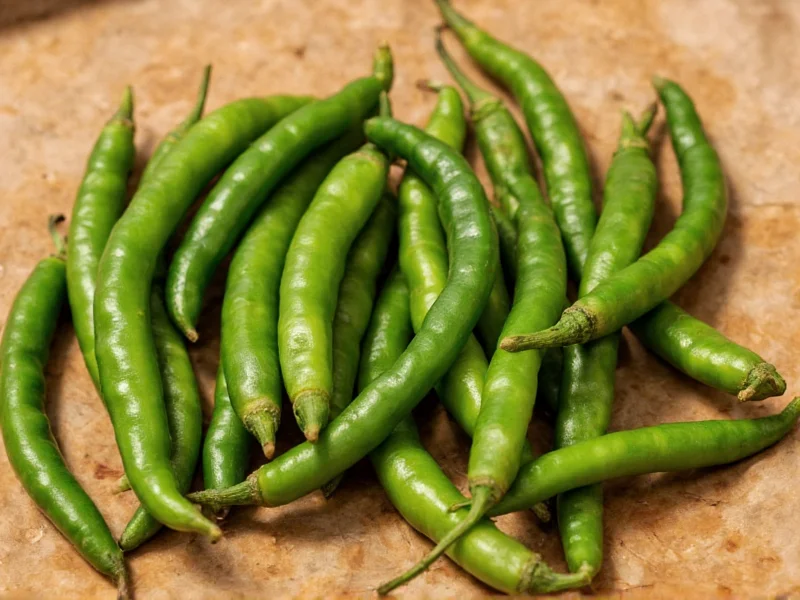Drying serrano peppers is a practical preservation technique that extends their shelf life while maintaining their signature heat level of 10,000-23,000 Scoville units. This process transforms fresh peppers into versatile culinary ingredients suitable for grinding into powder, rehydrating in sauces, or using whole in stews and soups. Home cooks and gardeners frequently dry serrano peppers to preserve seasonal harvests or take advantage of market abundance.
Benefits of Drying Serrano Peppers
Dried serrano peppers offer several advantages over their fresh counterparts. The drying process concentrates capsaicin, intensifying their heat profile while developing complex smoky notes. Properly dried serranos maintain 80-90% of their original flavor compounds, making them superior to store-bought alternatives that often lose potency during commercial processing. Home-dried peppers also eliminate concerns about preservatives or unknown growing practices found in mass-produced dried chilies.
Popular Drying Methods Compared
| Method | Time Required | Equipment Needed | Best For |
|---|---|---|---|
| Air Drying | 2-4 weeks | String, warm dry space | Small batches, traditional approach |
| Oven Drying | 6-12 hours | Oven, baking sheet | Quick results, controlled environment |
| Dehydrator | 8-15 hours | Food dehydrator | Large batches, consistent results |
| Sun Drying | 1-2 weeks | Screen trays, sunny location | Low-energy option in dry climates |
Step-by-Step Drying Instructions
Air Drying Serrano Peppers
This traditional method works best in environments with low humidity (below 60%). Start by washing and thoroughly drying fresh serranos. Thread a needle with kitchen string and carefully pierce through the stem end of each pepper. Hang the threaded peppers in a warm, dark, well-ventilated area away from direct sunlight. Check weekly for mold development, especially in humid climates. Complete drying typically takes 2-4 weeks when peppers become brittle and snap when bent.
Oven Drying Technique
Preheat your oven to its lowest setting (140-170°F or 60-75°C). Slice peppers lengthwise to expose interior membranes, or leave whole for powder making. Arrange in single layer on parchment-lined baking sheets. Prop oven door slightly open with a wooden spoon to allow moisture escape. Rotate trays hourly for even drying. Check after 6 hours - properly dried peppers should feel leathery then brittle. Total drying time ranges from 6-12 hours depending on oven accuracy and pepper size.
Dehydrator Method
Clean and slice serranos uniformly for consistent drying. Arrange on dehydrator trays without overlapping. Set temperature to 135°F (57°C) and dry for 8-15 hours. Check periodically after 6 hours - peppers are done when they snap rather than bend. This method preserves maximum flavor while preventing scorching. Commercial dehydrators with adjustable temperature control provide the most reliable results for how to dry serrano peppers at home with minimal effort.
Proper Storage of Dried Serrano Peppers
Complete moisture removal is critical before storage to prevent mold growth. Store dried peppers in airtight glass containers away from light and heat. For optimal longevity, include food-safe silica gel packets to absorb residual moisture. Properly dried and stored serrano peppers maintain peak quality for 1-2 years. Check containers monthly for any signs of moisture condensation, which indicates incomplete drying.
Culinary Uses for Dried Serrano Peppers
Dried serranos excel in applications where fresh peppers would introduce excess moisture. Crumble whole dried peppers directly into chili, stews, or bean dishes during cooking. For powder, grind completely dry peppers in a dedicated spice grinder until fine. Rehydrate by soaking in hot water for 20 minutes before using in salsas or sauces. The concentrated heat of dried serranos means you'll need approximately one-third the quantity compared to fresh peppers in recipes.
Common Drying Mistakes to Avoid
Many home preservers encounter issues with drying serrano peppers in oven methods when temperatures exceed 180°F, causing exterior scorching while interiors remain moist. Uneven slicing leads to inconsistent drying, with thicker pieces developing mold. Skipping the washing step risks introducing contaminants. Most critically, inadequate drying time leaves residual moisture that causes spoilage during storage. Always test multiple peppers from different parts of your batch before final storage.
Rehydrating Dried Serrano Peppers
For recipes requiring fresh pepper texture, rehydration restores flexibility while maintaining concentrated flavor. Place dried peppers in a heatproof bowl and cover with boiling water. Let soak for 15-20 minutes until pliable but not mushy. Drain thoroughly and pat dry before use. The soaking liquid contains valuable flavor compounds - incorporate it into sauces or soups rather than discarding. Rehydrated serranos work particularly well in mole sauces and adobo preparations.
Frequently Asked Questions
Can you dry serrano peppers without a dehydrator?
Yes, you can effectively dry serrano peppers without specialized equipment using oven drying or air drying methods. Oven drying at 140-170°F with the door slightly ajar works well for most home cooks, while air drying requires threading peppers on string and hanging in a warm, dark, well-ventilated space for 2-4 weeks.
How do you know when dried serrano peppers are properly dry?
Properly dried serrano peppers should be brittle and snap cleanly when bent. They'll feel lightweight with no moisture when squeezed. If any part remains leathery or flexible, continue drying. Peppers that bend rather than break contain too much moisture and risk mold development during storage.
What's the best way to store dried serrano peppers long-term?
Store completely dried serrano peppers in airtight glass containers with food-safe silica gel packets to absorb residual moisture. Keep in a cool, dark place away from heat sources. Properly stored dried serranos maintain optimal flavor and heat for 1-2 years. Check containers monthly for any moisture condensation.
Can you use dried serrano peppers in place of fresh in recipes?
Yes, but adjust quantities since dried serranos are more concentrated. Use approximately one dried serrano pepper for every three fresh peppers called for in a recipe. For powder, substitute 1/2 teaspoon dried serrano powder for one fresh pepper. Rehydrate dried peppers in hot water for 20 minutes when fresh texture is required.











 浙公网安备
33010002000092号
浙公网安备
33010002000092号 浙B2-20120091-4
浙B2-20120091-4